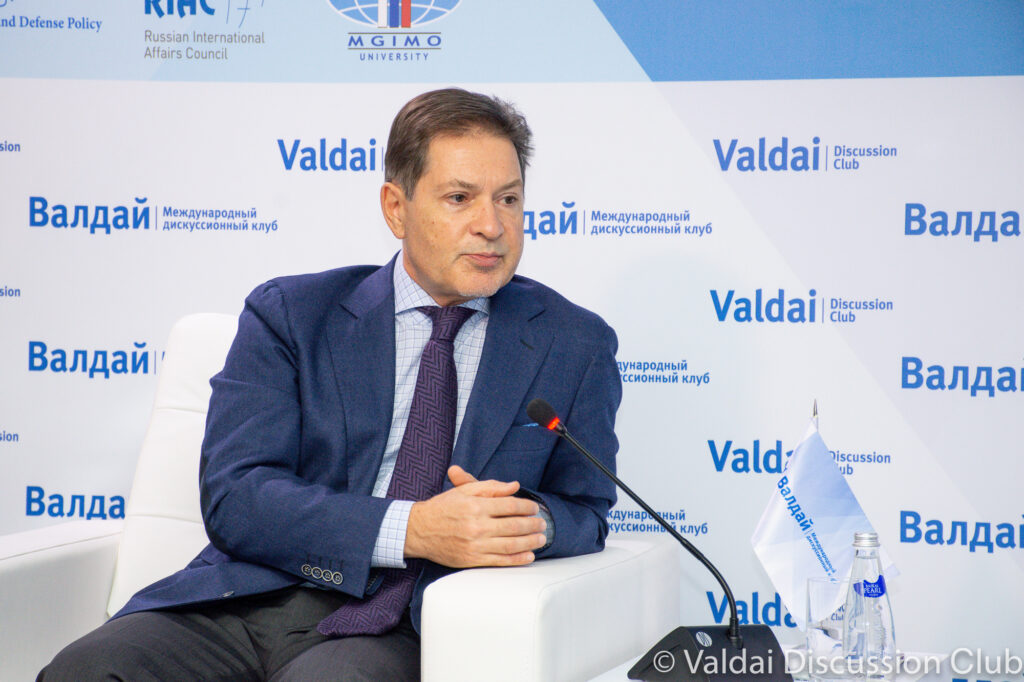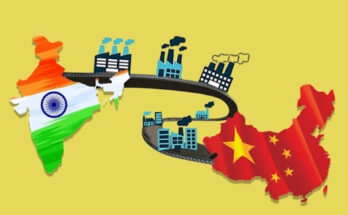Excerpts of the interview given by Prof. Andrey Bezrukov, Professor at the Department of Applied International Analysis, Moscow State Institute of International Relations to Thomas Babychan, President & Publisher of The Renaissance, on the topic, ‘Russia-Ukraine Conflict and its impact on International Relations’
Thomas Babychan – After the announcement of their Special Operations, several Nations slapped sanctions on Russia, others either stood neutral or silent, was Russia expecting such mixed global reactions?
Professor Andrey Bezrukov – In general, yes, we are quite accustomed to the United West reaction which again unfolded after the Russian Special operations. Russia and the West represent two different civilizational setups in terms of their political culture and mentality. The countries in the East represent a harmonious blend of ethnicities and religions, while the West is more uniform in such regards. Considering all the eastern and western divides of Ukraine, it belongs to the Eastern space.
What we saw is that the Western world voted as a united west, while the formerly colonised countries voted the other way or stood as mute spectators. This can be called an attempt of the Western countries to colonise Ukraine and thus a part of the east because the East in general has been a ‘resource appendix’ for the West.
This brings with it newer forms of colonisation like digital, technological and financial. “The world does not want anymore to be a colonial addition to the west.”
Thomas Babychan – What do you think about the reactions from Middle East nations like Saudi Arabia and UAE towards this conflict? They declined to take phone calls from the White House but were ok with keeping in touch with Vladimir Putin?
Professor Andrey Bezrukov – There are different aspects to it, but primarily it is based on their bilateral relations concerning business and economic partnerships. The stable and resourceful collaborations among these countries with Russia and the consensus to further such productive agreements to maintain regional peace and enhance economies from the available resources is the motivating factor for such a reaction by the Middle Eastern nations. “They have no nationalist interests in playing against Russia.”
Thomas Babychan – What are your thoughts on Israel’s foreign policy towards Russia and the special operations against Ukraine?
Professor Andrey Bezrukov – Israel and Russia have had good ties in terms of business and personal relationships. Especially since the very beginning of the twenty-first century, Israel and Russia have mutually agreed to maintain amicable relations for bilateral advantages on many grounds like defence, economy etc.
After the fall of the USSR, Russia was prepared to recognise Ukraine’s independence and a ‘brother next door’, but after the West tried to dismantle the regional peace by military negotiations with Ukraine (like a nuclear base etc), it became an existential threat for Russia. “Either you live with a bomb next door or you do something about it.”
Thomas Babychan – China and Russia have a strategic partnership which has been existing for almost 20 years now. What will be the implications of the Special Operation on Russia- China relations?
Professor Andrey Bezrukov – Russia’s operation will not have any decisive impact on its relationship with China in the long term. This is mainly because China and Russia are facing Western homogenisation together and have been “standing back to back”. China and Russia are also bound together by a commitment to regional stability and resource diplomacy, making it a marriage of convenience despite their differences.
A larger triangle of India-Russia-China without this solidarity will lead to western provocations to jeopardise a foundational peace.
Thomas Babychan – How can Russia-India-China relations (RIC partnership) be an alternative to the Western Hegemony?
Professor Andrey Bezrukov – All these three countries have their national interest with a focus on peace, development, economic growth and the like. The economic model we are having since the last fifty to sixty years based on Global institutions is falling apart. Because of the western technological cycle, we are facing severe “structural economic crises” like food and energy crises which are leading to a more general crisis impending for the world and its citizens. Thus it is time to build a new economic system where stability and peace shall be the foundational pillar and enhance trade, technological systems etc.
The Global System which was built around eighty years ago is weakening due to a technological cycle. There will be a competition among countries to be in the small club who will write the rules of the game, and we believe the uncompromising presence of Russia, India and China in that club.
At a time of block-based development of international space, there is a need for a massive technological capacity, which no one single country can achieve alone. Thus, India, Russia and China can form strategic partnerships in science, technology and economy leading to a “new non-alignment movement” or “technological non-alignment” which will also be a common platform to stay away from the West’s technological systems which will at the end undermine national security. Technological adversaries of the West could potentially become a Trojan horse in every country.

© Valdai Discussion Club
Thomas Babychan – Linking the internet-based banking systems of India and China with Russia to continue their economic transactions through the internet is a much-needed topic of discussion. How do you view this eco-political order in the world?
Professor Andrey Bezrukov – This precipitation from the breakdown of global financial institutions the West was building for decades. The power of the West to impose economic sanctions and freeze assets of countries without due application of the law is arbitrary. It is backed up by their capacity to do so. Thus a new system needs to be built where Russia, China and India have the capacity to contribute toward different configurations and establish a technical victory. The economic and political forums of the world today are not reliable and shall fall in the days to come.
Thomas Babychan – In the past few weeks, several Russian Diplomats and Politicians have been talking about the possibilities of completely severing diplomatic ties with the USA, UK etc. What are its chances and intent towards that and what will be the after-effects of such complete diplomatic disconnection?
Professor Andrey Bezrukov – I do not believe that it will happen, there are some voices which are being raised on that matter, but there are no serious voices that imply that Russia will want to sever relations with the USA, UK or leave the United Nations. There is no National interest in doing that for Russia. The west may try to exclude Russia from the G20, but it’s clear there is no consensus to do that and the Russian position in the United Nations is unseverable because, by the articles of the UN, the Russian position is permanent.
There is no law or situation in which it can be put into question, and Russia has no national interest in severing relations with other countries because Russia is not attacking anybody, it is the US leading the campaign against Russia, including Russian citizens who became a target from discrimination which is unheard before.
Thomas Babychan – Before 2020 we have been seeing practices from the Russian and European sides to improve the relationship between the EU and Russia, especially when it comes to former German Chancellor Angela Merkel and French President Macron’s relationship with President Putin. There was a momentum which could have created a strong bilateral relationship which is now under question. Even though in this current scenario it is a question, in future can we expect a growing relationship as both Russia and the EU are dependent on each other in different spheres by Russia keeping the US from the equation?
Professor Andrey Bezrukov – Economically and culturally, Russia and Europe are part of one space. It is not a new space, the ties go back to the millennium, Russia needs Europe as it is a part of it, and Europe needs Russia because without Russian resources they are powerless.
What we see is a definite and long-term policy of the Anglo-Saxon world, we lived through centuries when Great Britain tried to play Russia, Germany and France against each other. We remember Hitler, we remember Napoleon, and there was always British interference. I understand them, it is a very good policy for them, I cannot blame the British National Interest. So nobody in Europe can unite against them. The same policy is conducted by the US now, because an alliance between western Europe, particularly Germany and Russia would create such a powerhouse which will be a great competitor for the US. There is a bigger threat, the vision of De Gaulle that Europe starts in Lisbon and ends in Vladivostok, so the whole space would be united in terms of economy, human contacts etc. And it’s a huge geopolitical threat to the US.
The US is doing everything, successfully right now to create a long-term rupture between Russia and Western Europe in particular, but that will be over in a few years because the natural interest of Europe is to have peace and resources, so you can defeat geography but only for a short time. You can’t redefine geography. We are in a global economy now, naturally, we will be having, if not an alliance relationship but working relations. But right now the war conducted by the US and UK against Russia is with European resources and they want Western Europe to pay for their adventures which they try to impose.
Thomas Babychan – After the beginning of this conflict we have seen Representatives of the US going to countries like Iran and Venezuela to talk about supplying oil to the global market. These countries which were treated as small and powerless by the US were seen taking strong diplomatic and economic positions in their policies. How do you think this special operation will change the world political order, like strengthening the so-called small or powerless countries?
Professor Andrey Bezrukov – The conflict will give a severe blow to the global economy, even if the US with its allies achieves partially the goal of supplying more, which they are working towards, it does not cure other problems of food, supply of key resources. As we see prices are rising across the world like the crisis in Africa as there is a disruption in the global food supply chain.
We will see a scarcity in food production which will create a humanitarian crisis on top of everything else. It is very unfortunate as everything is linked, and once you start disrupting the global system by imposing sanctions, which disrupt trade and production, we end up in an extremely global economy and with instability comes conflict everywhere and human suffering. Unfortunately smaller countries will have no say in this, as the system is global and it will be a time of survival for them. Russia does not want to go that way.



